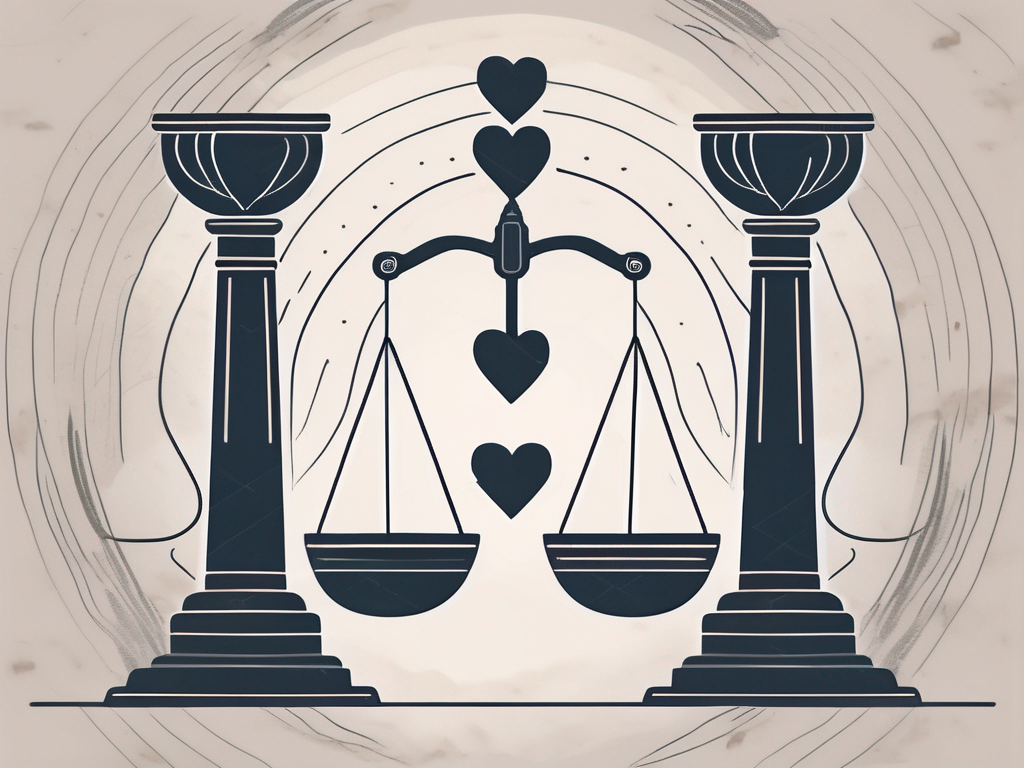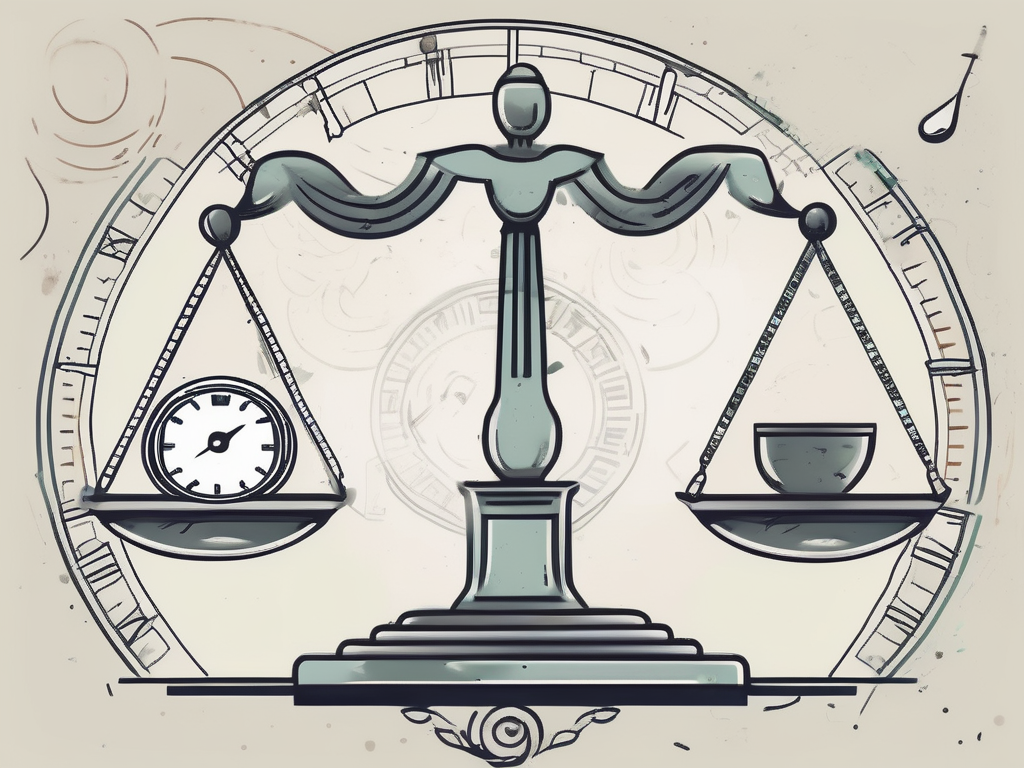Stoicism, with its ancient roots in Greek philosophy, has experienced a resurgence in popularity in recent years. People are increasingly drawn to its teachings on how to lead a more fulfilling and meaningful life. Yet, when it comes to health, some may question whether stoicism is truly a healthy philosophy to embrace. In this article, we’ll dive into the various aspects of stoicism and explore its effects on both mental and physical well-being.
Understanding the Philosophy of Stoicism
Before we delve into stoicism’s impact on health, let’s first gain a better understanding of this philosophy. Stoicism originated in ancient Greece and later flourished in Rome, wherein it served as a practical philosophy aimed at guiding individuals towards living a virtuous life.
Stoicism, with its roots in ancient Greece, is a philosophy that has stood the test of time. It was founded by Zeno of Citium in the 3rd century BCE and took root as a means of cultivating resilience and emotional resilience. The stoics believed in the power of reason and self-control, emphasizing the importance of living a virtuous life.
The Origins of Stoicism
Founded by Zeno of Citium in the 3rd century BCE, stoicism took root as a means of cultivating resilience and emotional resilience, emphasizing rationality and self-control.
The ancient Greeks were known for their philosophical pursuits, and stoicism was one of the many schools of thought that emerged during this time. Zeno of Citium, a philosopher from Cyprus, was the founder of stoicism. He believed that by practicing self-control and rationality, individuals could achieve a state of tranquility and well-being.
Key Principles of Stoicism
At its core, stoicism encourages individuals to focus on what is within their control while acknowledging and accepting what lies beyond it. This philosophy emphasizes the importance of developing the inner virtues of wisdom, courage, justice, and temperance. By doing so, adherents aim to achieve tranquility and well-being.
Stoicism is not just about accepting the things we cannot change; it is also about taking responsibility for the things we can change. The stoics believed that by focusing on our own thoughts, actions, and attitudes, we can cultivate inner virtues that lead to a more fulfilling life. Wisdom, courage, justice, and temperance are the cornerstones of stoicism, guiding individuals towards making ethical choices and living a virtuous life.
Wisdom is the ability to see things as they truly are and to make sound judgments based on reason. It involves seeking knowledge and understanding, as well as being open to different perspectives. Courage is the willingness to face challenges and overcome obstacles, even in the face of fear. Justice is the commitment to fairness and treating others with respect and dignity. Temperance is the practice of moderation and self-control, avoiding excess and finding balance in all aspects of life.
By embracing these virtues, stoics aim to achieve tranquility and well-being. They understand that external circumstances are beyond their control, but they can control their own thoughts, attitudes, and actions. Stoicism teaches individuals to focus on what they can change and to accept with equanimity what they cannot change.
Stoicism and Mental Health
Stoicism, an ancient philosophy that has stood the test of time, has garnered significant attention in the realm of mental health. In a world filled with constant stressors and emotional turmoil, stoicism offers a unique approach to cultivating emotional resilience and adopting a more thoughtful approach to our emotions.
At its core, stoicism encourages individuals to observe and understand their emotions without being overcome by them. Rather than being slaves to our feelings, stoicism teaches us to recognize that emotions are within our control. This powerful realization allows us to respond to challenging circumstances with clarity and rationality.
One of the key benefits of stoicism in relation to mental health is its ability to reduce the likelihood of being overwhelmed by negative emotions. Instead of suppressing or ignoring our feelings, stoicism allows us to acknowledge them and choose how to respond. By embracing our emotions and understanding their root causes, we can navigate through life’s challenges with a sense of purpose and inner strength.
Stoicism’s Approach to Emotions
Stoics advocate for a practice of emotional self-awareness. By taking the time to observe and understand our emotions, we can gain valuable insights into our own thought patterns and reactions. This self-reflection allows us to develop a greater sense of emotional intelligence, enabling us to navigate difficult situations with grace and composure.
Furthermore, stoicism teaches us that emotions are not inherently good or bad, but rather neutral. It is our interpretation and response to these emotions that determines their impact on our well-being. By adopting this mindset, we can learn to view our emotions as valuable sources of information, guiding us towards a more fulfilling and meaningful life.
Stoicism and Stress Management
In today’s fast-paced and demanding world, stress has become an inevitable part of our lives. Stoic teachings offer valuable insights into stress management, providing us with practical tools to navigate through life’s challenges.
One of the fundamental principles of stoicism is focusing on what is within our control. By accepting that we cannot control external circumstances, we can redirect our energy towards what we can control – our thoughts, attitudes, and actions. This shift in perspective empowers us to develop resilience and cope effectively with stressors.
Moreover, stoicism encourages us to reframe stressors as opportunities for growth. Rather than viewing challenges as obstacles, we can embrace them as chances to learn, adapt, and become stronger individuals. This mindset shift allows us to approach stressful situations with a sense of calm and confidence, knowing that we have the power to overcome them.
By adopting a stoic mindset, individuals may find themselves better equipped to handle life’s ups and downs. Stoicism offers a practical philosophy that can be applied to various aspects of our lives, including our mental health. By cultivating emotional resilience, embracing our emotions, and developing effective stress management strategies, we can lead more fulfilling and balanced lives.
Stoicism and Physical Health
Your physical well-being is undoubtedly interconnected with your mental state. Stoicism’s influence extends beyond the realm of the mind, making it relevant to one’s physical health as well.
Stoicism, an ancient philosophy developed by Greek and Roman philosophers, emphasizes the importance of living in accordance with nature and accepting the things we cannot control. This philosophy provides valuable insights into various aspects of life, including lifestyle choices and pain management.
Stoicism’s Influence on Lifestyle Choices
One key aspect of stoicism is the recognition that we are responsible for our own actions and choices. This principle can be applied to lifestyle choices, including diet, exercise, and overall self-care.
By adopting stoic principles, individuals may be more inclined to take responsibility for their physical health and make choices that align with their long-term well-being. This might involve committing to regular exercise, prioritizing nutritious meals, and engaging in activities that promote overall vitality.
Furthermore, stoicism encourages individuals to practice self-discipline and moderation. This can help individuals resist unhealthy temptations and develop healthy habits that contribute to their physical well-being.
For example, a stoic individual may choose to limit their consumption of processed foods and sugary drinks, opting instead for whole, unprocessed foods that nourish their body and support optimal health. They may also prioritize getting enough sleep, managing stress effectively, and engaging in activities that promote mental and physical relaxation.
Stoicism and Pain Management
Stoic philosophy also offers insights into managing physical pain. Stoics suggest that one should focus on what is within their control, including their response to pain rather than solely attempting to eradicate it.
While stoicism does not disregard medical treatments or pain relief methods, it suggests that by accepting and embracing pain as an inevitable part of life, individuals can develop resilience and endure discomfort with greater equanimity. Stoicism encourages individuals to shift their focus from the pain itself to how they respond to it.
By practicing stoic principles, individuals can cultivate a mindset that allows them to approach pain with acceptance and emotional resilience. This can lead to a reduction in suffering and an improved ability to cope with physical discomfort.
Moreover, stoicism teaches individuals to differentiate between pain and suffering. While pain is a physical sensation, suffering is often the result of our emotional response to pain. Stoics believe that by reframing their perspective and accepting pain as a natural part of life, individuals can reduce the emotional suffering associated with physical discomfort.
Stoicism also emphasizes the importance of maintaining a sense of gratitude and focusing on the present moment. By practicing gratitude, individuals can shift their attention away from their physical pain and towards the positive aspects of their life, fostering a greater sense of well-being.
In conclusion, stoicism’s influence on physical health extends beyond lifestyle choices and pain management. By adopting stoic principles, individuals can develop a greater sense of responsibility for their well-being and cultivate resilience in the face of physical discomfort. Stoicism offers valuable insights into how we can lead healthier, more fulfilling lives by aligning our actions with our long-term well-being and embracing the inevitable challenges that come with it.
Criticisms of Stoicism in Health Contexts
While stoicism has several merits, it is important to consider its potential downsides, particularly in health contexts.
Stoicism, an ancient philosophy founded by Zeno of Citium in the 3rd century BC, has gained popularity in recent years for its teachings on emotional resilience and mental fortitude. However, as with any philosophy or approach, there are criticisms that arise when applied to specific contexts, such as health.
Potential Downsides of Suppressing Emotions
While stoicism advocates for emotional resilience, some argue that suppressing emotions entirely may have negative consequences on mental health. Emotions serve as vital signals, offering insights into our needs, desires, and values.
Psychological research suggests that suppressing emotions can lead to increased stress levels, reduced well-being, and difficulties in interpersonal relationships. It is important to note that stoicism does not promote the complete eradication of emotions, but rather the cultivation of emotional awareness and control. However, individuals who adhere strictly to stoic principles may inadvertently suppress their emotions, potentially leading to adverse effects on their mental and emotional well-being.
Therefore, while stoic teachings offer valuable insights into managing emotions, it is crucial to strike a balance and not entirely dismiss the importance of emotional expression. Recognizing and acknowledging emotions can contribute to a healthier and more fulfilling life.
The Risk of Overlooking Physical Symptoms
Another criticism of stoicism is the potential for individuals to overlook physical symptoms due to a focus on maintaining emotional and mental composure. Stoicism’s emphasis on enduring pain and discomfort may lead individuals to dismiss or downplay symptoms that require medical attention.
It is essential to recognize the importance of listening to our bodies and seeking appropriate medical care when needed. Stoicism should not be an excuse for neglecting physical well-being but rather a reminder to adopt a balanced approach. While stoics may strive to endure physical discomfort, it is crucial to differentiate between temporary discomfort and symptoms that may indicate underlying health issues.
By incorporating stoic principles alongside a proactive approach to physical health, individuals can strike a harmonious balance between emotional resilience and physical well-being. This can involve regular check-ups, seeking medical advice when necessary, and being attuned to the signals our bodies send us.
In conclusion, stoicism, like any philosophy, has its limitations when applied to health contexts. While it offers valuable insights into emotional resilience and mental fortitude, it is important to consider the potential downsides of suppressing emotions entirely and overlooking physical symptoms. By adopting a balanced approach that incorporates emotional expression and proactive physical care, individuals can navigate the complexities of health while drawing upon the wisdom of stoicism.
Stoicism in Modern Health Practices
Despite the potential criticisms, stoicism has found applications in modern health practices, offering complementary strategies to improve overall well-being.
Stoicism in Psychotherapy
Elements of stoicism are being integrated into various forms of psychotherapy. Cognitive-behavioral therapy (CBT), for instance, draws upon stoic principles to help individuals reframe thoughts, manage emotions, and develop greater resilience in the face of adversity.
Stoicism in Mindfulness and Meditation
Stoicism’s teachings align closely with mindfulness and meditation practices. By cultivating present-moment awareness and observing thoughts and emotions non-judgmentally, individuals can develop a stoic mindset that enhances their mental and emotional well-being.
In conclusion, stoicism offers valuable insights into leading a healthy and fulfilling life. Its emphasis on emotional resilience, stress management, and personal responsibility can positively impact both mental and physical health. However, it is important to strike a balance and recognize the potential downsides of excessive suppression of emotions and neglecting physical symptoms. By integrating stoicism’s teachings into modern health practices, individuals can harness its wisdom to cultivate a better sense of overall well-being.












